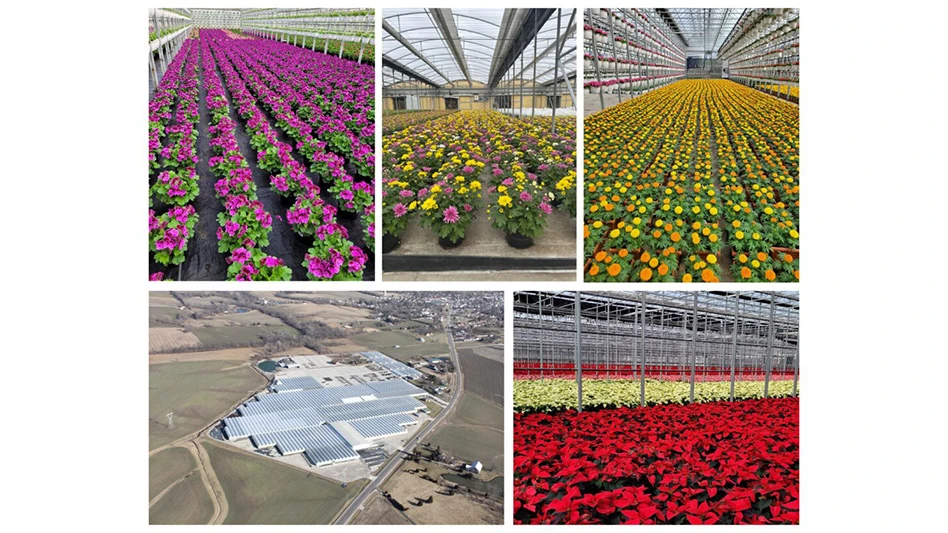

Can we talk about the coronavirus for a moment? I know you’d probably rather not. But coupled with the long-term ramifications of the recent financial crisis and recession, the pandemic’s impacts provide for timely conversation about reducing trade risk. Especially in an ever-changing economic environment that is still reeling from COVID-19’s effects.
Businesses are exposed to many different types of financial risks and there is a lot of risk in the nursery business. We already have a ton of exposure on the inventory side because we grow a perishable product. We mitigate liability risk by carrying auto policies with umbrella coverage. Cybersecurity policies mitigate loss if computers get hacked. Of course, worker’s compensation insurance is required in the event a team member gets hurt on the job.
I am not advocating that a nursery over-insure itself. You can really go down a rabbit hole on all the different loss coverages available to businesses. But it is prudent to consider coverage on your trade or account receivables (AR) to do business effectively and sleep well at night.
As the cost of producing nursery and greenhouse products continues to rise, more of us are searching for ways to manage our cash flow. The cost of production inputs (from containers, fertilizer, fuel, labor and others) increased 8.4% in 2022 and is projected to increase 3.5% in 2023. Due to the Federal Reserve’s interest rate hikes, the cost of borrowing money — which many nurseries and greenhouses rely on for cash flow management — has also increased.

nursery businesses from negative cash flow caused by
delayed, disputed or outright non-payment.
Cash flow management
Indeed, managing AR risk is becoming increasingly complicated as the business landscape continues to evolve with demand, technology and innovation. Our industry employs time-tested and accepted strategies to grow business and maintain operations. Offering trade customers payment terms on credit is one of them. But as I’m sure we’ve all experienced from time to time, it can sometimes be difficult to recover payments from customers who’ve purchased our products on credit.
From COVID-19’s onset, retail and service companies across industries continue to adjust to its impacts, with many facing challenges in recovering credit payments for goods and services they produce. As a result, nursery owners are considering asset insurance as a way to protect their trade accounts.
Having an insurance policy on receivables protects nursery businesses from negative cash flow caused by delayed, disputed or outright non-payment. It allows nurseries and greenhouses to receive funds more quickly, which helps secure the bottom line and offsets losses from the higher costs of production inputs and borrowing.
In the spring of 2020, Loma Vista Nursery implemented a policy to address accounts receivable uncertainties surrounding COVID-19 impacts and we began looking at insurance policies. We wanted coverage that would be tailored to the needs of different customer segments.
Our policy provides blanket coverage with a set threshold per customer and customized coverage for accounts that require additional protection. It also ensures that in the event of a loss, our business is not interrupted. A comprehensive system reduces exposure by using customer credit reporting and the Dun & Bradstreet D-U-N-S Number to identify potentially risky credits. The policy helps our customers by enabling us to extend higher credit limits because we know the risk is insured.
Access to credit
AR insurance also protects against financial losses from bankruptcy filings. Policies are established as part of nursery operations, which are then placed in trust with accredited insurance companies. This way, customers’ payments can be backed by the security of an insurance policy, ensuring nurseries receive payment even under dire circumstances.
Having an AR insurance policy side-steps the hassle and costs of engaging in legal proceedings when contractual terms cannot be met. This reinforces communications and protects the client relationship. In short, AR insurance offers important protection for the nursery’s financial future.
Businesses can access specific and reliable information in order to make better decisions, with insurance providing a safety net should things not go as planned. Nursery owners can have confidence to extend credit without fear of being unable to cover costs should a receivable not be collected.

assets over the long-term.
Mitigate nonpayment risk
A written accounts receivable policy can also help manage risk. This internal policy specifies guidelines about trade customer terms, including what they are and what the maximum amount of credit extended should be. It is important to review the policy regularly and adjust it, as necessary.
We share our policy with our sales team. Our credit manager maintains close communications with the trade company’s accounts payable department. The policy should not be so restrictive that it inhibits sales, but it should help mitigate risk and reduce the chances of nonpayment.
Staying connected with our trade accounts is vital because doing so is just good business. It also helps us understand when flexibility is necessary. Things happen in business and sometimes clients are unable to make on-time payments. Negotiating a payment plan that works for all parties is better to ensuring debts are paid off and drastic measures like initiating legal action are prevented.
AR insurance is available through many insurance carriers and you can customize a policy that best fits your nursery’s risk management needs. Blanket coverage is available at a set threshold with options to increase coverage on specific accounts or for specific circumstances. Buy-up coverage is available as well.
The cost of implementing an AR policy depends on the size of the business and the kind of policy purchased. But it is important to consider that AR insurance is an investment in protecting the nursery’s assets over the long-term. As recent history indicates, it is becoming increasingly important for nurseries to plan ahead. Setting resources in place offers peace of mind in the event of an economic downturn.
Protect nursery assets
Nursery leadership should assess prior losses and risk exposure before deciding if AR insurance is right for them. Insurance costs vary, but they’re typically less than 3%.
As a business owner, you understand the importance of protecting your assets. When running a nursery, proper planning is key for growth and financial success. This involves prioritizing operational needs such as staffing, building maintenance and products. Just like an individual would purchase homeowner’s insurance or an entrepreneur business insurance, the same thinking and planning should be applied to the nursery’s most valued assets: its customers.
A trade credit insurance policy is essentially an asset protection policy. This is especially important because unlike other types of loans, credits extended to trade customers are typically not secured by any tangible asset. In the event of default, it’s important to be prepared with the financial recourse to seek damages. An AR insurance policy provides peace of mind and security. In the event a customer should fail to make payments, the nursery will be able to recoup some of its losses.
We’ve found that AR insurance is an important tool for managing cash flow and protecting net working capital. By having this safety net in place, nursery owners can feel more confident about taking on new clients and managing receivables. This can be a key factor in determining the success of a nursery business. With sound AR insurance in place, you can rest assured that your receivables’ value will remain well-protected.


Explore the July 2023 Issue
Check out more from this issue and find your next story to read.
Latest from Nursery Management
- GIE Media Horticulture Group wins five regional 2025 Azbee Awards of Excellence
- Get to know Pat Reilly with NewGen Boxwood and the American Boxwood Society
- Terra Nova Nurseries introduces rust-free and disease-resistant heucherella
- John T. Nickel, founder of Greenleaf Nursery Co., passes away at 89
- Three tours offered at 2025 Farwest Show
- Garden Media Group announces sixth annual Women in Horticulture Week
- Star Roses and Plants announces National Knock Out Rose Day
- The Growth Industry Episode 4: How federal budget cuts are affecting horticulture nonprofits





